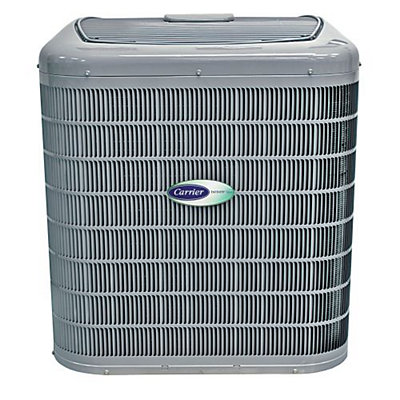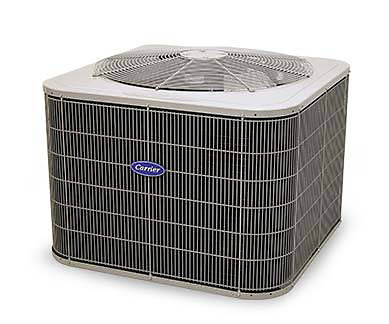Carrier Infinity® System air conditioners represent years of design, development and testing with one goal in mind – maximizing your family’s comfort. Along the way, we have created new technologies that deliver the outstanding quality and energy efficiency you demand while staying ahead of industry trends and global initiatives.
Breakthroughs like variable-speed technology, enhanced humidity control, smaller cabinet sizes and units designed specifically for the rigors of coastal area installations, mean there’s likely a model tailored to your needs. Whether you expect energy savings or maximum comfort, Carrier Infinity® System air conditioners have you covered.

Innovation, efficiency, quality: Carrier PerformanceTM Series air conditioners represent years of research and design with one goal in mind – enhancing your family’s comfort. With standard models and our available two-stage units, Performance™ Series air conditioners offer the Carrier quality, environmental stewardship and lasting durability that have endured for more than a century. And, to ensure maximum year-round performance, your dealer can update your system with a new Carrier furnace or fan coil and thermostat, all backed by the indoor comfort experts.

John Ruskin (1819-1900), British philosopher and artist wrote, “It is unwise to pay too much, but it’s unwise to pay too little... when you pay too little, you sometimes lose everything, because the thing you bought was incapable of doing the thing you bought it to do.” This holds true today, and here are some of the consequences of paying too little:
Ice or frost spotted anywhere on your AC, means you have a frozen evaporator coil.
Do this now: Defrost the coil to prevent damage. Head to your thermostat, turn your AC off and switch your fan setting to ON. This will power down the cooling cycle but allow your fan to continue to blow air over the coil to help melt the ice.
Now, before we get into the problems that caused the frozen coil, let’s look at why the ice is there in the first place…
How and why ice forms on your evaporator coil
Your evaporator coil is the A-shaped group of copper tubes inside your indoor unit. Cold refrigerant runs through these coils, collects heat from your home’s air and moves the heat outside.
And as warm air hits the coil, condensation occurs. Normally, this condensation is drained safely out of your home.
But 2 problems can cause the coil to get so cold that it freezes the moisture on the coils:
Let’s look at each of these problems and what causes them in more detail.
Problem #1: Restricted airflow
If there’s something restricting or reducing the amount of air flowing through your AC system, the coil will freeze.
Common problems that cause restricted airflow include:
Problem #2: Low refrigerant charge
A low refrigerant charge means you have a refrigerant leak. Refrigerant isn't “used up” like gas in a car. If you suspect refrigerant is a problem you’ll need a professional air conditioning contractor to find and fix the leak, clear out the remaining refrigerant, then add the right amount of refrigerant that your AC requires.
“How long does Freon last?”
Freon (which is really just a particular brand of refrigerant) lasts forever. It’s not like gas in car; it does not get “used up.”
You see, your air conditioner’s refrigerant system is a “closed/sealed system,” meaning that it does not allow refrigerant to escape in any way.
Of course, if you are low on refrigerant your system has a leak. So adding refrigerant without addressing the leak wastes money. A ton of it.
R-22 refrigerant (a common refrigerant in older ACs) is expensive because it’s being phased out by the EPA. Adding 7 lbs of Freon could easily cost you $700.
So, that leads to the next question.
“Are Freon leaks inevitable?”
Yes. Age eventually takes its toll on an air conditioner, so you could say a refrigerant leak is inevitable. Refrigerant circulates under high pressure and therefore wears down and thins the inside of the tubing.
A better question is, “What can I do to prevent refrigerant leaks?”
Your goal is to prevent refrigerant leaks and, when you do get them, nip them in the bud before they get too large. The larger the leak, the more refrigerant you lose.
How to prevent refrigerant leaks
Keep your dog away from the outside AC unit
Dog urine is acidic and can eat through the refrigerant coils. So keep your pooch away. Alternately, you could add a small fence around the unit. But make sure you leave at least 2 feet of space free around the AC so it can cool your home properly.
Get professional AC maintenance once a year
Many leaks occur because of vibration and wear and tear at multiple joints in the system. Annual air conditioner maintenance can catch any possible leak problems before they become expensive disasters.
You can— and should— run your A/C and ceiling fan together. Doing so can help lower your cooling costs each month, but only if you’re using them right.
Get up-to-date current news, promotions and industry tips.
We serve all of metro Atlanta.
We offer a variety of financing options.
Save money on our services.